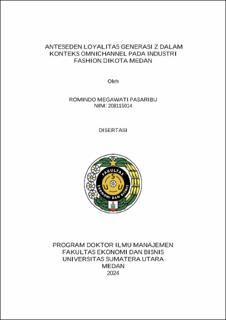| dc.contributor.advisor | Lubis, Arlina Nurbaity | |
| dc.contributor.advisor | Rini, Endang Sulistya | |
| dc.contributor.advisor | Sembiring, Beby Karina Fawzeea | |
| dc.contributor.author | Pasaribu, Romindo Megawati | |
| dc.date.accessioned | 2025-05-09T08:47:17Z | |
| dc.date.available | 2025-05-09T08:47:17Z | |
| dc.date.issued | 2024 | |
| dc.identifier.uri | https://repositori.usu.ac.id/handle/123456789/103769 | |
| dc.description.abstract | Developing the fashion industry in Indonesia contributed 18.01% or IDR 116 trillion to the National Gross Domestic Income (GDP). The government encourages fashion industry players in Indonesia to strengthen digitalization and sustainability aspects to produce quality and competitive fashion products. With changes in digital shopping behavior, offline stores are forced to implement e-commerce strategies by launching online stores or partnering with third-party platforms. Generation Z is a generation that grew up in an all-digital environment by utilizing social media platforms. Generation Z is a generation that likes to move from one brand (product) to another. Generation Z's mobile behavior is a challenge for retailers in the fashion industry in terms of providing and creating customer experience, engagement, and loyalty. This research aims to examine, analyze, and build customer experience and involvement to increase customer loyalty, moderated by Generation Z's hedonic cultural value orientation in Medan. The population in the study was Generation Z in Medan, spread across 21 sub-districts. The research sample was 440 respondents with a sampling technique using proportionate stratified random sampling. The data analysis technique uses Structural Equation Modeling - Partial Least Square (SEM PLS) by fulfilling all the required elements. The variables studied are channel integration, customer experience, customer involvement, hedonic cultural value orientation, and customer loyalty. The research results show that all variables of channel integration, customer experience, customer involvement, and hedonic cultural value orientation positively and significantly affect customer loyalty variables directly and indirectly. Meanwhile, the hedonic cultural value orientation variable cannot strengthen the relationship between customer experience and loyalty. The results of this research confirm that it is essential for fashion product retailers in Medan to use many online and offline channels that are well integrated in creating customer experience and engagement. The information conveyed across all channels retailers own must be consistent to create a seamless online shopping experience. Retailers must engage customers by improving communication and providing entertaining services through gamification. | en_US |
| dc.language.iso | id | en_US |
| dc.publisher | Universitas Sumatera Utara | en_US |
| dc.subject | Channel Integration | en_US |
| dc.subject | Customer Experience | en_US |
| dc.subject | Customer Engagement | en_US |
| dc.subject | Hedonic Cultural Value Orientation | en_US |
| dc.subject | Omnichannel | en_US |
| dc.subject | Generation Z | en_US |
| dc.title | Anteseden Loyalitas Generasi Z dalam Konteks Omnichannel pada Industri Fashion Dikota Medan | en_US |
| dc.title.alternative | Antecedents of Generation Z Loyalty in The Context of Omnichannel in The Fashion Industry in The City of Medan | en_US |
| dc.type | Thesis | en_US |
| dc.identifier.nim | NIM208115014 | |
| dc.identifier.nidn | NIDN0007047403 | |
| dc.identifier.nidn | NIDN0013056205 | |
| dc.identifier.nidn | NIDN0012107402 | |
| dc.identifier.kodeprodi | KODEPRODI61001#Ilmu Manajemen | |
| dc.description.pages | 428 Pages | en_US |
| dc.description.type | Disertasi Doktor | en_US |
| dc.subject.sdgs | SDGs 8. Decent Work And Economic Growth | en_US |


